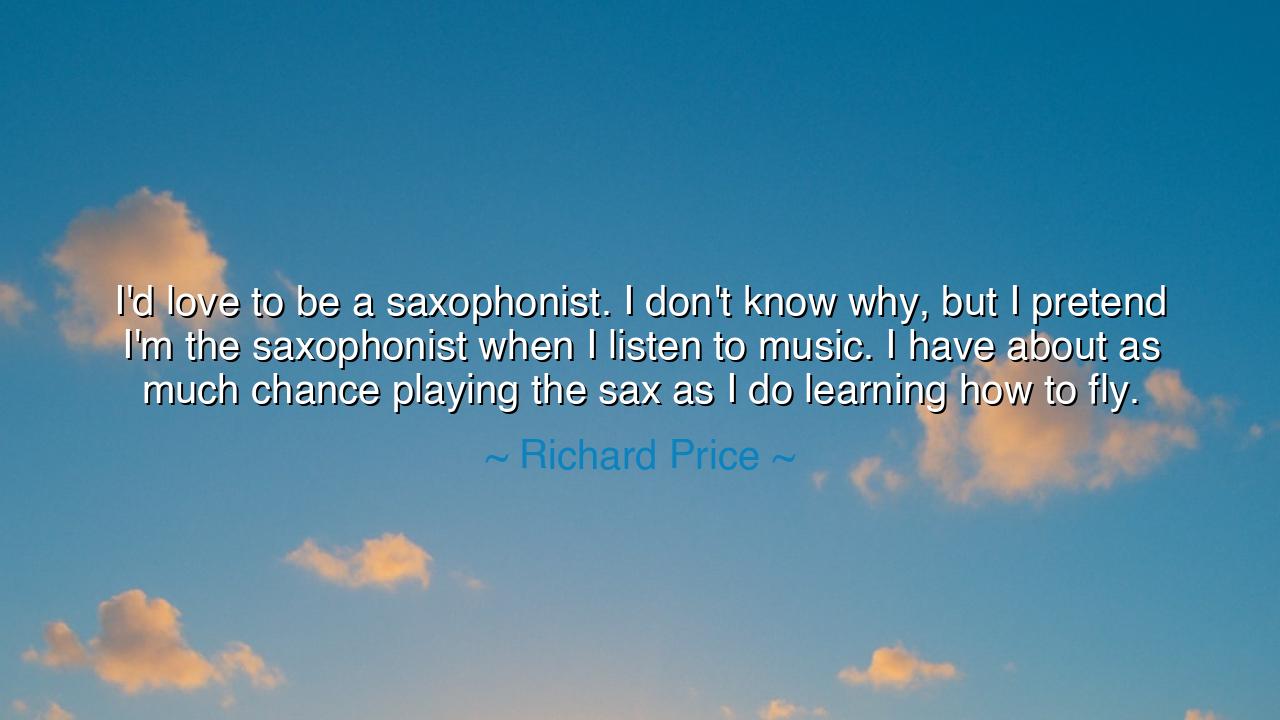
I'd love to be a saxophonist. I don't know why, but I pretend I'm
I'd love to be a saxophonist. I don't know why, but I pretend I'm the saxophonist when I listen to music. I have about as much chance playing the sax as I do learning how to fly.






In the quiet chambers of the human heart, there exists a longing for expression—a yearning to embody something greater than oneself. Richard Price, a writer who understands the complexity of human desires, once said, "I’d love to be a saxophonist. I don’t know why, but I pretend I’m the saxophonist when I listen to music. I have about as much chance playing the sax as I do learning how to fly." In these simple, playful words, there is a deep truth about the human condition—that we often dream of becoming someone or something beyond our reach, drawn to the power of creativity and art even when it seems unattainable. The saxophone, with its rich, soulful sound, calls to Price's inner self, and through this yearning, he reveals the universal struggle to connect with something greater than our own limitations.
This longing to become something more is not a modern phenomenon. The ancients, from Homer to Plato, understood the impulse to dream and aspire to greatness. Socrates himself, in his wisdom, would often speak of the ideal forms of beauty, virtue, and knowledge—those things that we may never fully attain but that guide us toward personal growth. In the way Price speaks of the saxophone, he echoes the ancient yearning to connect with a higher calling, even when that calling seems elusive or impossible. The human soul is always searching for ways to express itself—whether through music, words, or deeds—and yet, much like Socrates’ search for truth, we often feel the tension between the ideal and the possible.
Consider the example of Leonardo da Vinci, who embodied this very struggle. Da Vinci, like Price, was drawn to many pursuits: he was not only a painter, but a scientist, a musician, an engineer, and an inventor. Though his primary legacy lies in the arts, his imagination stretched far beyond the canvas. He is said to have played the lute, and it’s likely that he, too, felt the pull of the saxophone in his own time—his soul moved by the music, even as his hands may not have had the skill to perform it. In his notebooks, he often jotted down sketches and ideas for inventions that seemed as unattainable as learning how to fly. Like Price, da Vinci's mind and heart wandered in realms of possibility and imagination, always reaching for something greater than what his hands could create.
In the world of art and music, we often find ourselves striving for mastery in things that seem just beyond our grasp. The saxophonist, whose mastery of the instrument brings joy to all who listen, represents an ideal that many of us long for but cannot attain. Yet, like Price, we are drawn to the mystique of these pursuits, even if they are out of our reach. The great Beethoven, though deaf in his later years, continued to compose, guided not by his physical hearing, but by his internal vision of music. He, too, could have felt as though he had as much chance of playing the saxophone as he did of hearing it in his later life. And yet, his creativity transcended his limitations, illustrating the timeless power of human resilience and the ability to reach for the seemingly impossible.
The lesson in Price’s words is clear: our desires, even those that seem unattainable, shape who we are. Desire is not a weakness, nor is it a futile longing for things we cannot have. Rather, it is a call to action, a force that propels us forward, shaping our lives in ways we might not immediately understand. Price’s longing to be a saxophonist is not simply a wish to play an instrument; it is a reflection of his desire to connect with something that speaks to his soul. And though he may never play the sax, his yearning enriches his life, giving him a connection to the music that defines his inner world.
In your own life, think of the things that draw you—those passions, those pursuits that may seem out of reach, yet still stir something deep within you. Embrace those desires, even if they seem impossible. Like Price, you may never play the saxophone, but through your yearning, you may find another form of expression, another way to connect with the world. Perhaps you will create, maybe not what you originally imagined, but something just as meaningful. Whether it is in art, music, writing, or another form of creativity, never dismiss your desire to reach for something that moves you. Like Beethoven, da Vinci, or Price, we are all meant to explore and express that which stirs our souls, for it is through this exploration that we find growth and purpose.
The pursuit of the unattainable is not futile, but the very essence of human spirit. When we reach for the impossible, we are tapping into the boundless potential of the soul, not bound by the limitations of the world but liberated by the freedom to imagine, to create, and to dream. So, let the saxophone, or whatever your heart desires, be the symbol of your aspirations—for it is in the reaching that you become more than you ever thought you could be.






AAdministratorAdministrator
Welcome, honored guests. Please leave a comment, we will respond soon